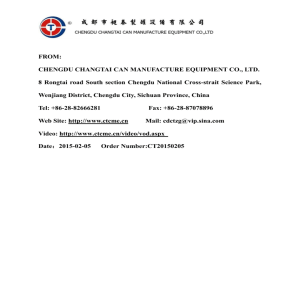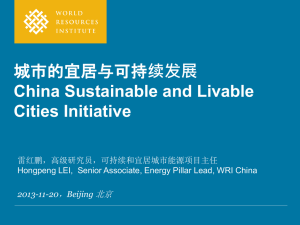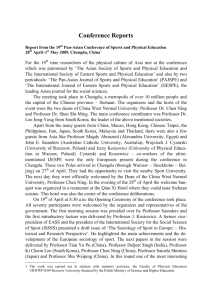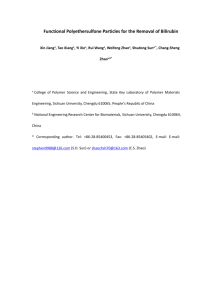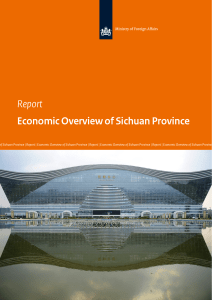ITU Centers of Excellence Network for Asia and the Pacific
advertisement
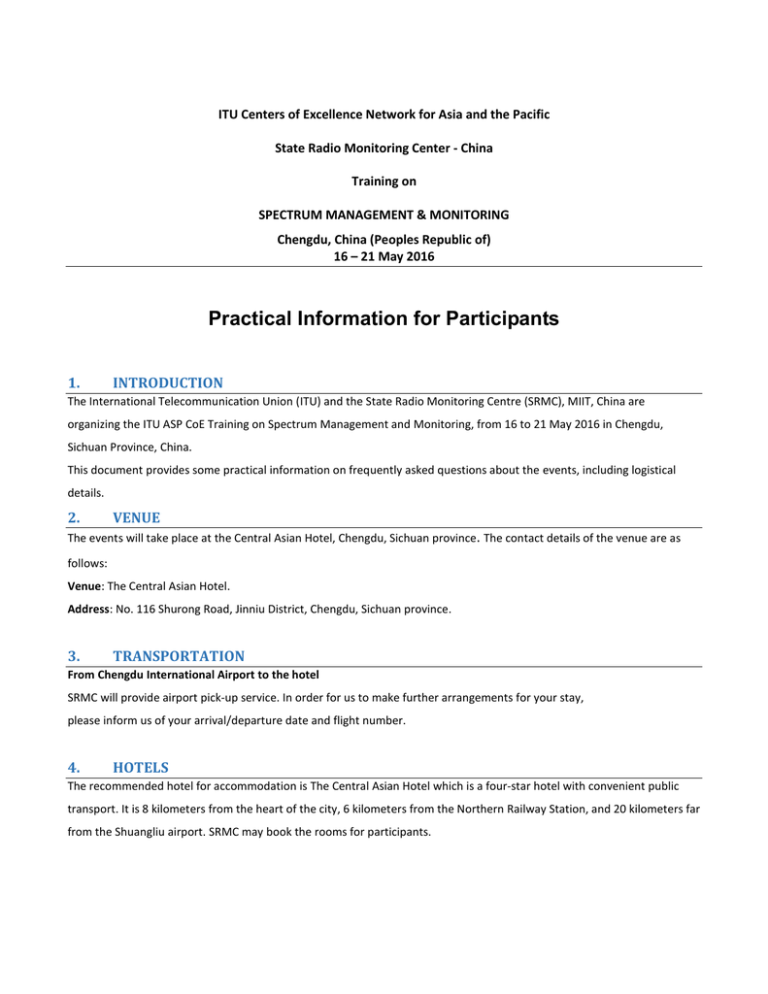
ITU Centers of Excellence Network for Asia and the Pacific State Radio Monitoring Center - China Training on SPECTRUM MANAGEMENT & MONITORING Chengdu, China (Peoples Republic of) 16 – 21 May 2016 Practical Information for Participants 1. INTRODUCTION The International Telecommunication Union (ITU) and the State Radio Monitoring Centre (SRMC), MIIT, China are organizing the ITU ASP CoE Training on Spectrum Management and Monitoring, from 16 to 21 May 2016 in Chengdu, Sichuan Province, China. This document provides some practical information on frequently asked questions about the events, including logistical details. 2. VENUE The events will take place at the Central Asian Hotel, Chengdu, Sichuan province. The contact details of the venue are as follows: Venue: The Central Asian Hotel. Address: No. 116 Shurong Road, Jinniu District, Chengdu, Sichuan province. 3. TRANSPORTATION From Chengdu International Airport to the hotel SRMC will provide airport pick-up service. In order for us to make further arrangements for your stay, please inform us of your arrival/departure date and flight number. 4. HOTELS The recommended hotel for accommodation is The Central Asian Hotel which is a four-star hotel with convenient public transport. It is 8 kilometers from the heart of the city, 6 kilometers from the Northern Railway Station, and 20 kilometers far from the Shuangliu airport. SRMC may book the rooms for participants. Checking-In: Participants would have to check-in after arrival at the hotel and settle the fees for accommodation directly. For the booking with SRMC the rates for single room and breakfast are RMB306 /room/night, and RMB 336 /room/night for Muslim meals option. Only cash (RMB) is accepted. Please note that SRMC would not be able to provide transfer services to venue in case you choose to stay elsewhere. 5. PASSPORT AND VISA Citizens of other countries should possess a valid passport to enter China. The passport should be valid for at least 30 days after arrival date in China. Citizens of some countries are required to obtain a visa in order to enter and stay in China. The visa must be requested and obtained from the Chinese Embassy/consulate in your country, or if there is no such office in your country, from the one that is closest to the country of departure. In order to get the invitation letter for the VISA, please forward the registration confirmation email and send the copy of your passport to Ms. Yu Yali(yuyali@srrc.org.cn) and Ms. Wang Zhixia(wangzx@oetsi.com) with a copy to Mr. Aamir Riaz (aamir.riaz@itu.int) before 8th of April 2016 the latest. 6. ABOUT CHINA The People's Republic of China is a socialist country with its own characteristics. China is a developing country and lies in the east of Asia. It is bordered by Russia and Mongolia to the north and North Korea to the northeast. To the south, its neighbors are Vietnam, Laos, Thailand and the Philippine. To the west and southwest India, Burma, Bhutan, Nepal and Pakistan. To the east Japan, which faces China across the East China Sea. China is a vast territory of over 9,600,000 square kilometers. It has a population of more than 1.3 billion, which is a quarter of the world population. It consists of 34 provinces, autonomous regions, and municipalities directly under the Central Government. Beijing, which is situated in the Northeast of China, is the capital. China is characterized by a continental climate. The latitude spans nearly 50 degrees. The greater part of the Chinese territory is situated in the Temperate Zone, its southern part in the tropical and subtropical zones, and its northern part near the Frigid Zone. Temperatures differ therefore rather strikingly across the country. The northern part of Heilongjiang Province has long winters but no summers; while the Hainan Island has long summers but no winters. The People's Republic of China was founded on October 1, 1949. Today, China is implementing reform and opening-up policies, and has established socialist market economy, thereby charting the course for socialist modernization with Chinese characteristics. Language and Character Chinese is commonly used in modern China. It is one of the six working languages designated by the United Nations and, as a written language; Chinese has been used for 6,000 years. 6.1. About Chengdu Chengdu is the capital of Sichuan province, of Southwest China, maintaining sub-provincial administrative status. Chengdu is also one of the most important economic centers, transportation and communication hubs in Western China. According to the 2007 Public Appraisal for Best Chinese Cities for Investment, Chengdu was chosen as one of the top ten cities to invest in China. The fertile Chengdu Plain, on which Chengdu is located, is also known as "the country of heaven", or more often seen translated as "the Land of Abundance". It was recently named China's 4th -most livable city by China Daily. Szechuan cuisine, or Sichuan cuisine is a style of Chinese cuisine originating in the Sichuan Province famed for bold flavors, particularly the pungency and spiciness resulting from liberal use of garlic and chili peppers, as well as the unique flavor of the Sichuan peppercorn. Peanuts, sesame paste and ginger are also prominent ingredients in Szechuan cooking. 7. TRANSPORTATION Public Transportation in Chengdu consists of: subway, buses and taxi. To call for a taxi with in Chengdu: 0086 28 962999. 8. HEALTH CARE Pharmacy and good medical facilities are largely available in Chengdu. Emergency medical services: 120 9. USEFUL EMERGENCY NUMBERS Police: 110 Fire Brigade: 119 10. LANGUAGE Chinese is the official language in China, but English is widely understood in major hotels, restaurants, banks and businesses. The training will be held in English. 11. CURRENCY AND BANKING The official currency accepted in China is RMB. Major foreign currencies may be exchanged to RMB at banks. Official banking hours can vary slightly, but in general are from 9:00 a.m. to 17:00 p.m Banks are generally closed on weekends and holidays. The current exchange rate is approximately 6.5RMB to 1 US Dollar as of February 2016. Cash can be easily withdrawn 24/7 from the numerous ATMs spread in the city. 12. CREDIT CARDS Major credit cards (American Express, Diners Club, MasterCard, VISA and UnionPay card) are accepted by most hotels, restaurants, car rental agencies, department stores, but no small local shops. Usually there is a sticker at the entrance indicating which cards are accepted. 13. CLIMATE Temperature in May in Chengdu: Average high (C/F):30/86 Average low (C/F): 15/59 The suitable for wearing coat, shirts, shirt, skirts. 14. LOCAL TIME The local time is UTC/GMT +8hours. 15. TIPPING Tipping is not customary in China. 16. TAXES Usually the displayed prices have sales tax included in China. 17. ELECTRICAL APPLIANCES The standard power supply in China is 220 volts, the frequency is 50Hz. The type of power outlet/connector used in China is a two parallel outlet-hole or three-hole outlet triangle. For the convenience of participants to use, we will provide wiring board, which is porous outlet. Two parallel outlet holes three-hole outlet triangle wiring board 18. CALLING CODE The national code of China is 0086 and Chengdu is 0086 28. 19. BUYING A LOCAL SIM China has three operators, China Unicom, China Telecom and China Mobile. Now buy a local SIM card in China requires real-name system purchase. Foreigners bring the passport in the operator’s business hall buy the local SIM card. 20. DRIVING Cars in China have their steering wheel on the left and are driven on the right of the road.For additional information, please contact the following local coordinators: Ms. Yu Yali (yuyali@srrc.org.cn) Ms. Wang Zhixia (wangzx@oetsi.com) Mr. Christiono Andreas (andreas.christiono@itu.int) Mr. Aamir Riaz (aamir.riaz@itu.int) Have a nice trip to Chengdu!
